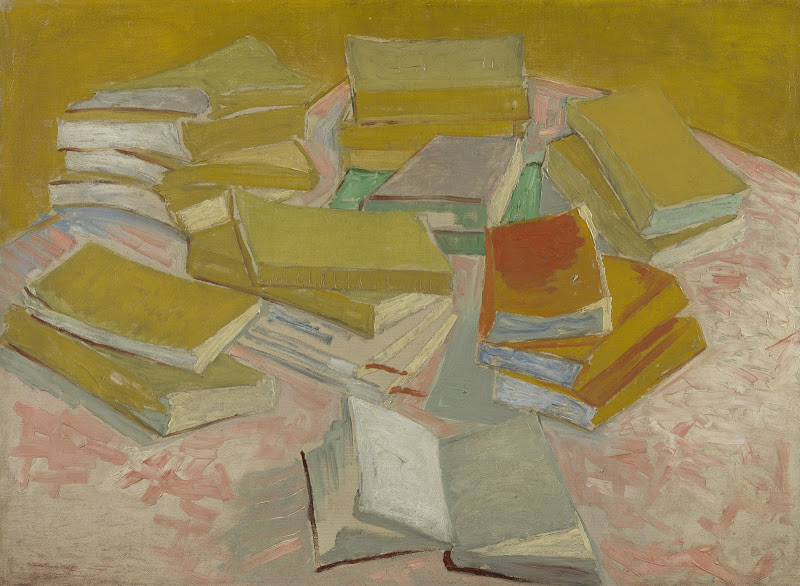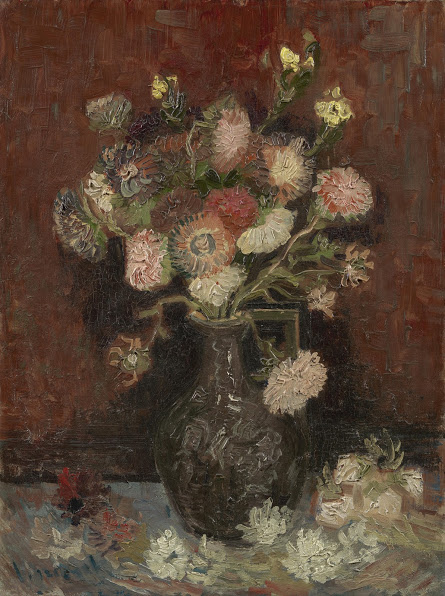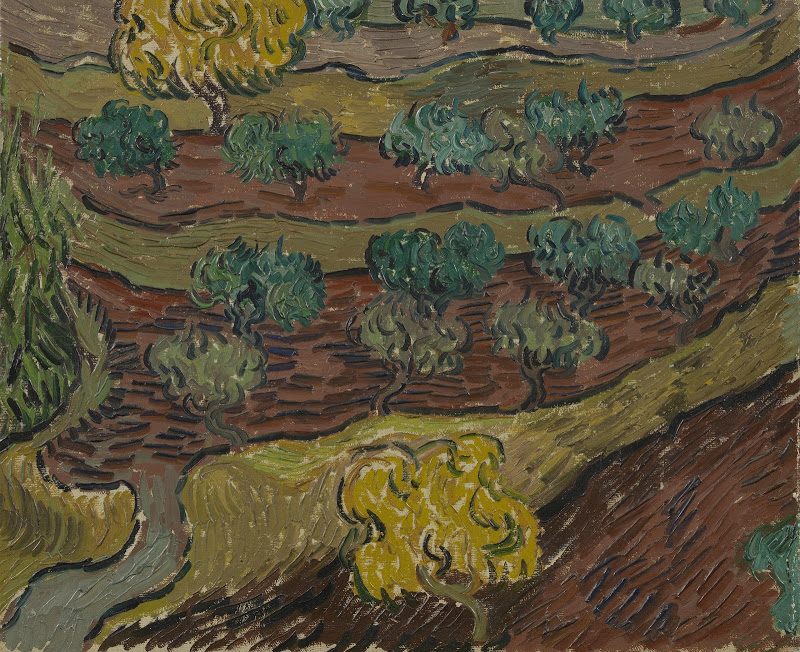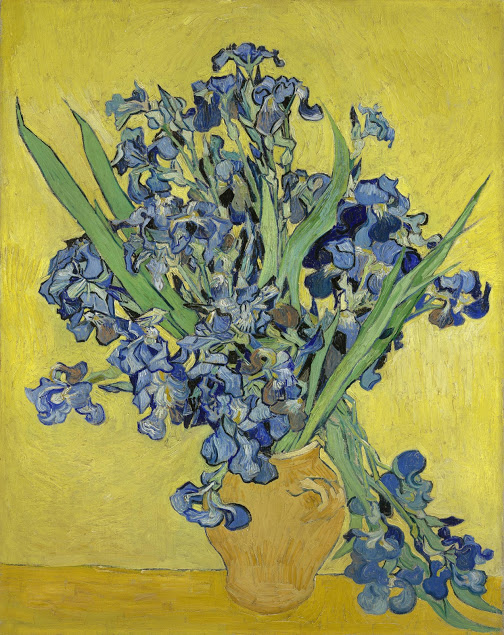
I usually post “a quotable” blog at the beginning of each week. It’s inspiring to start the week with a reflection on—
well, life and difficult concepts.
The past week, however, has been rough. As I prepare for my move overseas, I feel stuck– literally and physically stuck– for the first time. This is supposed to be my last summer in the U.S.; I’ve been here for a decade. My visa expires in July, and off to Istanbul, I fly! Except that I’m not sure if I can?
At the moment, flights are canceled. The Turkish government-approved emergency flights are offered to Turkish citizens in certain states, and the option to fly with pets has been suspended. So, like many of you, I’ve been wallowing in uncertainty, but particularly this morning the idea of doing anything sounded tedious and mentally exhausting.
Then, as I was browsing online, I came across a letter that Vincent van Gogh (March 30, 1853–July 29, 1890) wrote to his brother Theo in 1880.
Now, Van Gogh does not necessarily stand out as a jovial, optimistic figure. However, his letter, which discussed how he coped with anxiety and despair reveals the overlooked, hopeful side of Van Gogh.

Paris, December 1887-February 1888
Van Gogh Museum, Amsterdam (Vincent van Gogh Foundation)
In his letter to Theo, Van Gogh explored the conflict between himself and his father, as well as his battle with depression and anxiety:
“I, for one, am a man of passions, capable of and liable to do rather foolish things for which I sometimes feel rather sorry. I do often find myself speaking or acting somewhat too quickly when it would be better to wait more patiently. I think that other people may also sometimes do similar foolish things.
Now that being so, what’s to be done, must one consider oneself a dangerous man, incapable of anything at all? I don’t think so. But it’s a matter of trying by every means to turn even these passions to good account.
For example, to name one passion among others, I have a more or less irresistible passion for books, and I have a need continually to educate myself, to study, if you like, precisely as I need to eat my bread. You’ll be able to understand that yourself. When I was in different surroundings, in surroundings of paintings and works of art, you well know that I then took a violent passion for those surroundings that went as far as enthusiasm. And I don’t repent it, and now, far from the country again, I often feel homesick for the country of paintings.”
Van Gogh had left his family home due to familial tension and had been spending the summer in Cuesmes, Belgium.
He continued to combat clinical depression and anxiety until it claimed his life in 1890 at the age of 37. However, as his letters compiled in Dear Theo: The Autobiography of Vincent van Gogh and in My Life & Love Are One demonstrate, he often sought magic in the state of melancholy.
As he wrote in the same letter:
“So instead of succumbing to homesickness, I said to myself, one’s country or native land is everywhere. So instead of giving way to despair, I took the way of active melancholy as long as I had strength for activity, or in other words, I preferred the melancholy that hopes and aspires and searches to the one that despairs, mournful and stagnant.”
Van Gogh, Piles of French Novels 1887; Vase with Chinese Asters and Gladioli 1886; Giant Peacock Moth 1889; Olive Trees on a Hillside 1889; Irises 1890. Courtesy of Van Gogh Museum, Amsterdam.
The notion of a type of melancholy that hopes, strives, and seeks as opposed to the kind that surrenders is a powerful one. It connotes positive acceptance; sadness, despair, and anxiety in this context can coexist with happiness, gratitude, and the will to live. Active melancholy then can be useful anytime, but especially during these times when ambiguity adds another layer to our pre-existing anxieties and fears.
For Van Gogh, active melancholy meant finding solace in work—painting and creating. “How much sadness there is in life!” he wrote in another letter, “Nevertheless one must not become melancholy. One must seek distraction in other things, and the right thing is to work.”
For me, active melancholy means sitting here at my desk and writing —although it may be a daunting task to find the inner motivation to do so during uncertain times. Doing that which is meaningful is an act of active melancholy. So is working to sit with all the emotional patterns that have me swinging from one extreme to the other.
For me, it means, in Van Gogh’s words, to tune in to “calmness, pure harmony and music” that’s still inside us even when we find ourselves “in the depths of misery.”
What does active melancholy mean to you?
“Let us keep courage and try to be patient and gentle. And let us not mind being eccentric, and make distinction between good and evil.”
Vincent Van Gogh






For me, active melancholy is possible when I am sad, or tired, or even despairing, but I have a quiet strong place inside that I can still feel, and it tells me this sadness will pass. It tells me that being melancholy is part of the human condition, part of the richness of it. It is wonderful to be able to create something even in the midst of melancholy and this you have done by writing this post. Thank you!
LikeLiked by 2 people
So true– it is an integral part of the richness of the human condition. I love that you mention the “quiet strong place inside that I can still feel” and that “tells me this sadness will pass.” It has taken me years to get to a place where I recognize that core, and it’s such a beautiful thing! Thanks, Nancy!
LikeLiked by 1 person
Hello. I hope that your visa/travel problem resolves itself properly. Good luck.
Neil S.
LikeLiked by 1 person
Hi, Neil, thank you!
LikeLike
Interesting perspectives on hope and melancholy. I hope your travel and life plans become more clear and manageable.
LikeLiked by 1 person
Thank you!
LikeLiked by 1 person
Hi Neri:
First, congratulations on earning your doctorate. What a great milestone in your intellectual journey. Thank you for your thoughtful post on active melancholy. I suspect during this extended shelter-in-place period, many people are struggling with melancholy, depression, ennui, etc. But literature and the arts have something to teach us: some of the greatest works of literature and art have been born out of the ashes of melancholy and sadness. With the proper reflection and imagination, melancholy can be a wellspring of creation, leading to new perspectives and discoveries. This is why I recently wrote a post: Why You Should Start a Coronavirus Diary. I use the Diary of Anne Frank as an example of someone who wrote a diary as a way to process her feelings during a very difficult, dark time. And think of the millions of lives that her diary touched and inspired for over a century. That is the profound grace of the human spirit: the ability to transcend tragedy and find beauty and inspiration in artistic expression — and when shared, that work becomes “the props, the pillars to help [mankind] endure and prevail.” Cheers, Alex.
LikeLiked by 2 people
Hi Alex, thank you! And very well said. I feel as though I have learnt how to deal with melancholy and sadness from and through books and literature. I will read your post. Hope you’re doing well! -Neri
LikeLiked by 1 person
Incidentally, your Kafkaeque travel predicament reminded me of a memorable line from a classic song from The Eagles titled Hotel California (that was inspired by John Fowles’ brilliant novel, The Magus. If you haven’t read it, you are in for a real treat. It is considered one of the greatest modern novels). The line is: “You can check-out any time you like / But you can never leave!” Is that how you feel? Cheers. Alex
LikeLiked by 1 person
Haha, I like that line. I want to read the novel now!
LikeLiked by 1 person
Neriman such a profound insight from Van Gogh thanks for sharing. This idea of actively striving and grappling with life through melancholy is just beautiful. I think many creative people can relate to this, as describers of the lived experience in all of it’s shades, isolation and melancholy which everyone is feeling to some degree right now can be a stone in the shoe, waking people up to what is going on inside and outside of them. I hope have a safe passage home xx
LikeLiked by 1 person
Thanks! ❤ I never knew Van Gogh was so profound in his letters to his brother; it was a nice coincidence for me. I hope you're doing well!
LikeLiked by 1 person
Yes it’s so nice when you discover these kinds of things, these treasures from history
LikeLiked by 1 person
Yes doing very well….working very hard during the lockdown, harder than ever before but gave myself permission to have a break today which is so good to relax again. Stay well and safe x
LikeLiked by 1 person
Glad to hear that you’re doing well. Yes, you deserve a much-needed break! ❤
LikeLiked by 1 person
This is a beautiful and though-provoking post! Channelling melancholy can be indeed useful and surprise us in ways more than one. Like Alexandar wrote some of the greatest works in literature were written from the pathos of sorrow, and also some of the greatest works of art. Active melancholy-may be it does give us an impetus to get, howsoever possible, and find solace in things we like doing. For me, reading makes a lot of difference and so does reading. It works as a distraction.
LikeLiked by 1 person
It really does work as a distraction and makes whatever we are doing more meaningful, I think. I didn’t want to delve deep into this in the post, but Van Gogh’s idea of active melancholy seems similar to what Acceptance and Commitment Therapy (ACT) advocates. Don’t resist what you’re feeling, and commit to an activity that is meaningful to you at difficult moments. Thanks for sharing what you think!
LikeLiked by 1 person
“Don’t resist what you’re feeling, and commit to an activity that is meaningful to you at difficult moments.”, beautifully said. One of my friends insists that grief and sorrow are emotions that must be accepted and that makes it so much easier to overcome it.
LikeLiked by 1 person
I am no stranger to melancholy, though I never did succumb to depression. Active melancholy for me starts with allowing the emotion to come through like a tidal wave and smash me to smithereens. This outburst feels like ‘purging’. Then I pick myself up and busy my hands. Writing doesn’t always come easily to me at such times….and when it does, it is usually poetry, not prose. I find cooking, gardening or sewing more grounding. Two years ago, I discovered while embroidering a tablecloth that it was letting me re-imagine life stitch-by-stitch. And when I feel somewhat healed through such measures, there is meditation to make everything all right.
LikeLiked by 1 person
This is beautiful, Anjali. I love that you have a wide range of activities to commit to when the going gets tough. Last year, I sat down and made an actual list of activities that I can do when I feel particularly down. It’s been so helpful to see that list when I most need it. I hope you’re doing well!
LikeLiked by 1 person
Thank you! Yes, I am ‘flourishing’ through the lockdown (though I touch wood as I write this)! Did your plans to move to Istanbul come through?
LikeLike
I really liked reading this. I love art and I realized that I do hold a similar view that Van Gogh held. I try to actively work out my issues. Reading this brought a smile to my face 🙂 thanks!
LikeLiked by 1 person
Hi Isabelle, it makes me happy to hear this 🙂 -Neri
LikeLike